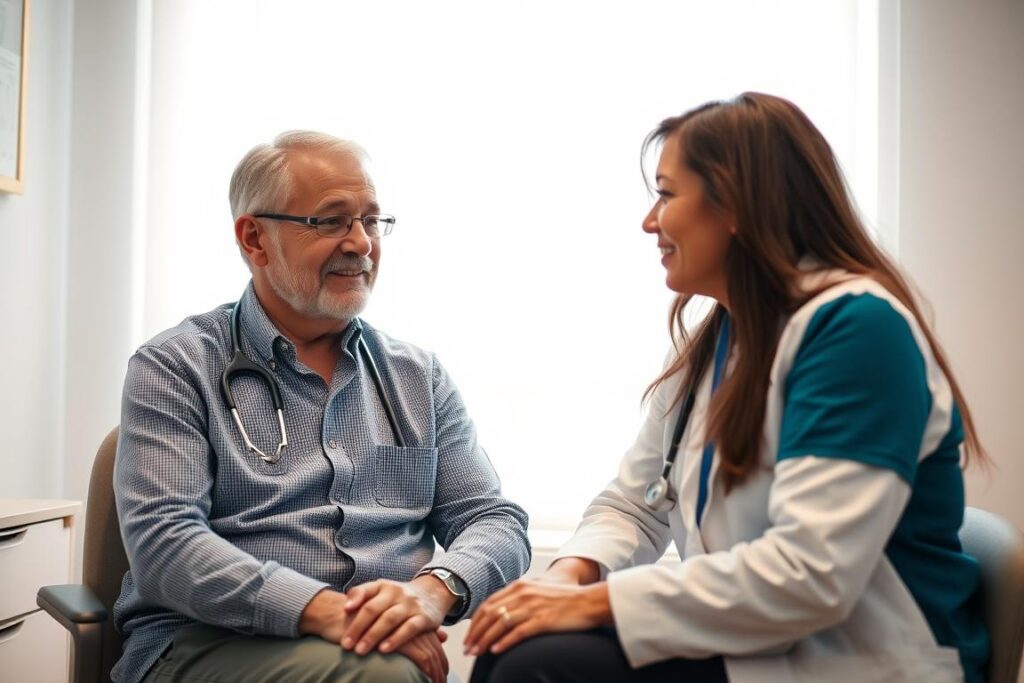We all want to be healthier and feel better. The World Health Organization (WHO) says taking control of our health is key. This means making choices that help us stay well.
Patient-centered care is a big part of this. It lets us be active in our health care. We can make choices based on what we know.
Being informed and involved helps us get better care. This article will show you how to become more empowered in your health care. We’ll cover everything you need to know.
Key Takeaways
- Understanding the concept of patient empowerment
- The importance of patient-centered care
- Strategies for achieving healthcare empowerment
- The benefits of being an empowered individual
- Improving health outcomes through informed decision-making
Understanding Patient Empowerment
Empowering patients means teaching them, standing up for them, and working together to make decisions. This is key in healthcare because it affects how well care is given and how patients do.
Defining Patient Empowerment
The World Health Organization (WHO) says patient empowerment is when people take charge of their health. This shows how important it is for patients to be involved in their care. It means giving them the knowledge and confidence to handle their health well.
The Importance of Empowerment in Healthcare
Patient empowerment is key because it leads to better health, happier patients, and more efficient use of resources. Empowered patients stick to treatment plans, make smart choices, and take steps to stay healthy.
Patient advocacy and shared decision-making play big roles. Advocacy makes sure patients’ rights are looked after. Shared decision-making means working together to make choices.
Our Role as Patients
We have a big role in our health care journey. We make choices that affect our well-being. The Patient-Centered Outcomes Research Institute (PCORI) says being empowered is key to better health outcomes. By being active in our care, we ensure our needs are met and get the best treatment.
Recognizing Our Authority in Health Decisions
We have the right to make choices about our care. This means understanding our health, treatment options, and the risks and benefits. Patient education is key to making informed decisions. By learning, we can talk to our doctors confidently and choose what’s best for us.
Knowing our rights as patients is also important. This includes the right to informed consent and to refuse treatment. By being informed and proactive, we can take control of our health.
Building Confidence in Our Voices
Being confident in talking to our doctors is vital. This means asking questions, sharing concerns, and standing up for ourselves. Self-management is a critical aspect of patient empowerment. By being confident in managing our health, we can get better results.
To feel more confident, we can prepare for doctor visits. Write down our questions, bring a support person, and know what we want. By being prepared, we can ensure that our needs are met and that we receive the care we need.
- Prepare a list of questions for your healthcare provider.
- Be clear about your health goals and expectations.
- Seek support from family and friends.
Educating Ourselves About Health Conditions
Learning about our health is more than just knowing our conditions. It’s about taking control of our health journey. Being informed helps us make better choices and talk better with our doctors.
Our health is our most precious asset. Knowing our health conditions well can greatly improve our well-being. Patient education is essential for patient empowerment. It lets us move through the healthcare system with confidence.
Researching Reliable Medical Information
In today’s world, lots of medical info is just a click away. But not all of it is trustworthy. It’s important to find reliable sources to make smart health choices.
The National Institutes of Health (NIH) is a great place to start. The NIH offers detailed and current info on health conditions and treatments.
Finding Trusted Healthcare Resources
It’s not just about learning about our health conditions. We also need to find trusted healthcare resources. This includes knowing our health insurance, our patient rights, and the services available to us.
| Resource | Description | Benefits |
|---|---|---|
| National Institutes of Health (NIH) | Provides detailed medical info on health conditions and treatments. | Up-to-date and accurate info for making informed choices. |
| Health Insurance Providers | Offers info on health insurance benefits and coverage. | Helps understand the financial side of healthcare and access needed care. |
| Patient Advocacy Groups | Supports patients in navigating the healthcare system and advocating for their rights. | Empowers patients to be active in their healthcare. |
By using these resources and learning about our health, we can boost our patient empowerment. It’s about being proactive, asking the right questions, and finding the info and support we need.
Communicating Effectively with Healthcare Providers
Talking well with healthcare providers is key to being in charge of our health. It lets us play a big part in our health care. We can make sure our needs are met and our concerns are heard.
Preparing for Medical Appointments
Getting ready for doctor visits is important. We should write down our questions and concerns before we go. It’s also good to bring someone for support and to take notes.
- Bring a list of our current medications and dosages.
- Prepare a list of questions and concerns.
- Consider bringing a support person.
Asking the Right Questions
Asking the right questions at doctor visits helps us understand our health better. We should ask for clear answers if we don’t get it. Here are some key questions to ask:
| Category | Example Questions |
|---|---|
| Condition | What is my diagnosis? What are the symptoms? |
| Treatment | What are my treatment options? What are the possible side effects? |
| Follow-Up | When should I follow up? What should I watch for? |
Expressing Concerns and Preferences
We must tell our healthcare providers about our worries and what we prefer. This means talking about our fears, any anxieties, and our treatment choices. This way, our care fits what we need and value.

The Agency for Healthcare Research and Quality (AHRQ) says good communication is key to better health care. By getting ready, asking the right questions, and sharing our concerns, we can improve our health care experience and results.
Building a Support Network
As we face our health challenges, having a strong support network is key. It helps us manage health issues better. This leads to better health outcomes and a higher quality of life.
The American Cancer Society says a support network is vital. It offers emotional support, practical help, and a sense of community. This network empowers patients, making them feel more in control of their health.
Connecting with Loved Ones
Family and friends are at the heart of our support network. They provide emotional support, help with daily tasks, and go with us to doctor’s visits. By sharing our health struggles with them, we strengthen our relationships and get the care we need.
It’s good to teach our loved ones about our health issues. This way, they can offer better support. We can share reliable health information and resources with them.
Joining Support Groups and Communities
Expanding our network by joining support groups and communities is also beneficial. These groups connect us with others facing similar health issues. We can share experiences and learn from those who have been through it.
Support groups can be found at local hospitals, online, and through health organizations. For example, checking out patient success stories can inspire and guide us.
By building and engaging with our support network, we create a more empowering health journey. This collective support improves our health outcomes, well-being, and sense of control over our health.
Navigating Health Systems
Understanding the healthcare system can be tough. But knowing our rights and options is key for patient empowerment. By taking charge of our health, we need to grasp the details of health systems to make smart choices.
Understanding Health Insurance and Benefits
Grasping our health insurance and benefits is a big step. We need to know what’s covered, our costs, and how to get care in our network. The Centers for Medicare and Medicaid Services say we have the right to our medical records and to make informed care choices.
To get the most out of our health insurance, we should:
- Check our policy to see what’s covered and what’s not.
- Track our medical costs to know our out-of-pocket expenses.
- Ask questions if we’re not sure about our coverage.
Familiarizing Ourselves with Patient Rights
Knowing our patient rights is also important. These rights include informed consent, privacy, and access to medical records. Understanding these rights helps ensure we get the care we need and are treated with respect.
Some key patient rights to know include:
- The right to clear information about our diagnosis, treatment, and prognosis.
- The right to be involved in decisions about our care, including refusing treatment.
- The right to see our medical records and ask for corrections if needed.
By understanding our health insurance and benefits, and knowing our patient rights, we can better navigate health systems. This way, we can get the best care possible.
Leveraging Technology for Empowerment
Health technology has given us more control over our health than ever. We can now manage our well-being, make informed choices, and get care at home.
Health apps are a big step forward. They let us track our health, like how active we are and if we’re taking our meds. This way, we can see how we’re doing and change our habits if needed.
Using Health Apps for Tracking
Health apps are key for tracking our health. They have many features, like:
- Tracking how active we are and our fitness
- Reminding us to take our meds
- Monitoring vital signs, like blood pressure
These tools help us understand our health better. For example, tracking our activity keeps us motivated to exercise. And reminders help us stick to our treatment plans.
Telehealth: Accessing Care from Home
Telehealth has changed how we get healthcare. The American Telemedicine Association says it can make care better and get us more involved. With telehealth, we can:
- See doctors without leaving home
- Get care from specialists without going to the hospital
- Get help quickly, which can make our health better
Telehealth makes managing our health easier and cheaper. It also makes our lives better.
In short, technology lets us control our health. Health apps and telehealth help us feel better. As we move forward in healthcare, using technology is key to better health and life quality.
Setting Personal Health Goals
Setting health goals is a great way to take control of our health. It lets us make choices that improve our well-being. By setting personal health goals, we become more involved in our care.
To set effective goals, we need to make them clear and reachable. One good method is to use SMART goals. These are Specific, Measurable, Achievable, Relevant, and Time-bound.
Establishing SMART Goals
SMART goals help us map out our health journey. For example, instead of saying “I want to be healthier,” we can say “I will reduce my blood pressure by exercising for 30 minutes, three times a week, for the next three months.”
The American Heart Association says SMART goals can lead to better health outcomes. They help us take charge of our health and make real progress.
Monitoring Our Progress
After setting SMART goals, it’s key to track our progress. We can do this by keeping track of our successes, finding challenges, and adjusting our plans as needed.

By checking our progress often, we stay motivated and make better choices for our health. This keeps us on track and helps us reach our health goals. It improves our overall well-being.
Adopting a Proactive Mindset
Being proactive can greatly help patients improve their health. By actively managing their health, people can live better lives. This means they can handle their health issues better and enjoy a higher quality of life.
The National Patient Advocate Foundation says self-advocacy is key for better health care. Self-advocacy lets patients share their needs and wants clearly. This way, they get the care that fits their situation best.
Embracing Self-Advocacy
Self-advocacy means being well-informed, asking questions, and talking clearly with doctors. It helps patients make smart choices about their health care.
- Prepare a list of questions before medical appointments.
- Seek clarification on any unclear diagnoses or treatments.
- Express concerns or preferences regarding care plans.
Being Informed about New Treatments
Knowing about new treatments and health care advances is important. Patients who know their options can work better with their doctors.
| Benefits of Being Informed | Actions to Stay Informed |
|---|---|
| Better health outcomes through informed decisions | Research reliable medical information |
| Increased confidence in navigating healthcare | Follow reputable health news sources |
| Improved ability to advocate for oneself | Participate in patient education programs |
By being proactive, advocating for ourselves, and keeping up with new treatments, we can control our health. This leads to better overall well-being.
Understanding the Role of Health Literacy in Patient Empowerment
Health literacy is a key factor in patient empowerment. It helps patients understand their health information and make informed decisions. By improving health literacy, patients can overcome barriers to empowerment and take a more active role in their healthcare.
Health literacy is not just about reading and writing skills. It involves understanding health information, navigating the healthcare system, and making informed decisions about one’s health. When patients have high health literacy, they can better manage their health conditions, adhere to treatment plans, and advocate for themselves.
Improving health literacy is essential for patient empowerment. It allows patients to become more involved in their healthcare decisions, ask questions, and seek additional information when needed. By empowering patients with the knowledge and skills to navigate the healthcare system, we can create a more patient-centered approach to healthcare.
There are various strategies to improve health literacy, such as providing clear and simple health information, using plain language, and incorporating visual aids. Healthcare providers can also play a significant role by assessing patients’ health literacy levels and tailoring their communication to meet their needs.
By addressing the barriers to empowerment and improving health literacy, we can empower patients to take control of their health and make informed decisions. This not only improves patient outcomes but also enhances the overall quality of care.
Benefits of Improving Health Literacy
Improving health literacy has numerous benefits for patients and the healthcare system as a whole. Some of the key benefits include:
- Improved health outcomes: Patients with higher health literacy are more likely to manage their health conditions effectively and adhere to treatment plans.
- Increased patient satisfaction: When patients understand their health information, they are more likely to be satisfied with their healthcare experience.
- Reduced healthcare costs: By empowering patients to make informed decisions, we can reduce unnecessary healthcare costs and improve resource allocation.
- Enhanced patient-provider communication: Patients with higher health literacy can communicate more effectively with healthcare providers, leading to better understanding and adherence to treatment plans.
By prioritizing health literacy and addressing the barriers to empowerment, we can create a more patient-centered healthcare system that empowers individuals to take control of their health.
Engaging in Shared Decision-Making
Shared decision-making is key to patient empowerment. It lets us take charge of our health care. This way, our health decisions are made with our values and needs in mind.
When we share in decision-making, we team up with our doctors. We discuss our health, treatment options, and the good and bad of each choice. This helps us pick the best path for our health.
Understanding Collaborative Care
Collaborative care is at the core of shared decision-making. It’s about working together. Patients, doctors, and sometimes family members join forces. This ensures all health aspects are considered when making decisions.
Key elements of collaborative care include:
- Open communication between patients and healthcare providers
- A patient-centered approach to care
- Shared responsibility for health decisions
Understanding collaborative care helps us navigate the health system better. We can make choices that fit our health goals.
Knowing Our Options
It’s important to know our treatment options well. We need to understand the benefits, risks, and alternatives of each choice.
| Treatment Options | Benefits | Risks |
|---|---|---|
| Medication | Effective for managing symptoms, easy to administer | Potential side effects, dependency |
| Surgery | Can provide a definitive solution, potentially curative | Surgical risks, recovery time, possible complications |
| Lifestyle Changes | Improves overall health, can be preventive, empowers patients | Requires commitment, may have a slower impact |
By knowing our options and engaging in shared decision-making, we can control our health. We make choices that are right for us.
The Impact of Empathy in Patient Empowerment
Empathy is key in patient empowerment. It lets us feel confident in the healthcare system. When we feel heard and supported, we’re more likely to take charge of our health.
Empathy builds a strong bond between patients and healthcare providers. This bond leads to better health results.
Cultivating Compassion for Ourselves
Being kind to ourselves is essential when facing health challenges. We must accept our feelings and let them sink in. This way, we can lower stress and anxiety, which harm our health.
Recognizing Empathy in Healthcare Providers
Healthcare providers who show empathy greatly enhance our care experience. We should seek out those who listen well and understand us.
| Aspect of Care | With Empathy | Without Empathy |
|---|---|---|
| Patient Engagement | Higher engagement due to feeling understood | Lower engagement due to feeling neglected |
| Health Outcomes | Better outcomes due to effective communication | Poorer outcomes due to misunderstandings |
| Patient Satisfaction | Higher satisfaction due to feeling supported | Lower satisfaction due to feeling ignored |
Empathy is vital in patient empowerment. Understanding its role helps us move towards a more patient-focused healthcare.
By showing empathy, both to ourselves and healthcare providers, we boost our patient empowerment. This improves our health and quality of life.
Celebrating Our Achievements
It’s important to celebrate our successes, no matter how small. As patients, we often focus on challenges. But, it’s key to also recognize our achievements.
This helps us reinforce positive behaviors and boosts our motivation. It also improves our quality of life.
Acknowledging Small Wins
Celebrating small wins is a powerful way to acknowledge our progress. The American Psychological Association says it can improve mental health and motivation. We can start by setting small, achievable goals and celebrating each success.
Some ways to acknowledge small wins include:
- Journaling: Writing down our achievements helps us reflect on our progress.
- Sharing with others: Telling friends and family about our successes can provide additional support and encouragement.
- Rewarding ourselves: Treating ourselves to something we enjoy can be a great motivator.
Reflecting on Our Journey
Reflecting on our journey is key to patient empowerment. Looking back at our progress helps us identify areas for improvement. It also lets us recognize patterns and make informed decisions about our future care.
To reflect on our journey effectively, we can:
- Identify key milestones: Recognizing significant events or achievements in our health journey.
- Assess our challenges: Understanding the obstacles we’ve faced and how we overcame them.
- Plan for the future: Using our reflections to inform our future health decisions and goals.
Continuing Our Empowerment Journey
This journey of patient empowerment is lifelong. By learning about our health, we keep up with new health trends and medical research. This helps us stay informed and proactive in our health care.
Staying Informed
The National Institutes of Health (NIH) highlights the value of lifelong learning. It improves health care and boosts patient involvement. We can use many resources to stay updated, making us active in our health care.
Embracing New Developments
New treatments and technologies keep coming. By staying informed, we can learn about these and talk to our doctors. This makes our journey of empowerment stronger and helps us get better health results.



